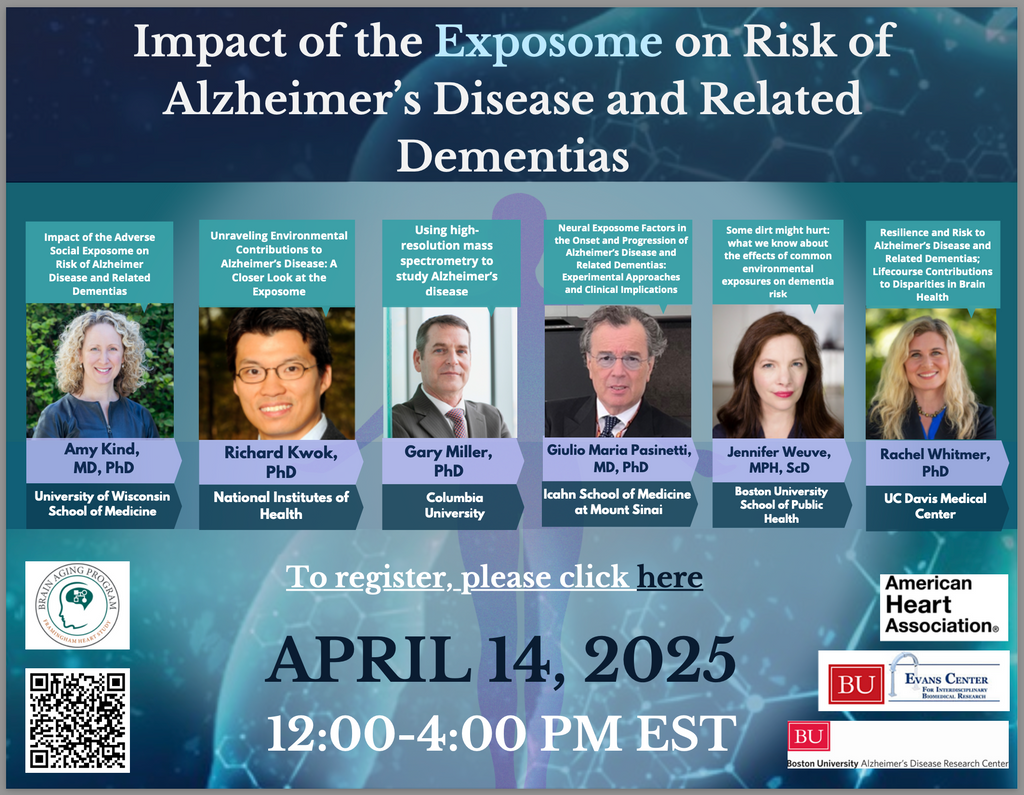Precision Medicine for Alzheimer Disease and Related Disorders
Co-Directors
Drs. Lindsay Farrer, Rhoda Au and Alice Cronin-Golomb
Synopsis
This ARC seeks to initiate a precision medicine program in Alzheimer disease (AD), a clinical area for which there is great need and broad expertise and resources at BU. We hypothesize that the reason current drugs used to treat AD are ineffective and clinical trial studies have largely failed is the assumption that AD is a single disease, when in fact, it has been well documented by clinical, imaging, neuropathological and genetic studies that AD is a heterogeneous disease. The primary aims of this ARC are to identify subtypes of AD within the Framingham Heart Study (FHS) dataset, validate these subtypes using other available data from the national AD Centers database and other public databases, investigate the biological underpinnings of these subtypes, and identify new therapeutic targets specific for these subtypes. As a first step, we will employ multiple computational strategies including “Big Data” analytics in collaboration with Clarivate Analytics (formerly known as Thomson Reuters) for identifying AD subtypes or risk factor profiles that are defined by profiles based on deep phenotyping (e.g., cognitive testing, medical history, brain imaging, biomarker, lifestyle) and ‘Omic (e.g., genetic, genomic, methylomic, proteomic, and metabolomic) data. In subsequent funding periods, we propose to validate these subtypes in other datasets, derive stratification model(s) for assigning prospectively studied persons along the disease spectrum to disease subtypes for testing drug response and predicting prognosis, and evaluate experimentally the biological underpinnings of one or more subtypes and identify new therapeutic targets. This project introduces a very novel approach for extracting key information from very large and complex datasets that will define subtypes and risk profiles for AD. This program is uniquely suited at BU because of the availability of and experience working with the FHS dataset, world class clinical and basic science experts in AD, and opportunity to replicate and validate findings using local resources including the BU AD Center.
What we’re working on now …
Recycling of the amyloid precursor protein (APP) from the cell surface via the endocytic pathways plays a key role in the generation of amyloid ß-peptide (Aß), the accumulation of which is thought central to the pathogenesis of Alzheimer disease (AD).
This ARC explores the role of vesicular sorting proteins and other genes involved in protein trafficking in the etiology and pathophysiology of AD and other neurodegenerative disorders. The power of this ARC lies in its interdisciplinary expertise and ability to validate any finding using independent approaches of genetic epidemiology, cell biology, model systems and pathology.
HIGHLIGHTS
Notably, cognitive decline has been observed disproportionately in persons affected with MS and to a lesser extent with celiac disease, suggesting that these three diseases share a common immune or inflammatory pathway. Future studies of the protective mechanism of these HLA alleles may provide insight into the neurobiology of cognitive decline and dementia and novel therapeutic approaches for these disorders.
5th Annual FHS-BAP Symposium
ARC Members
(This ARC includes 20 faculty from various disciplines)
Farrer, Lindsay, Medicine, Neurology, Ophthalmology, Epidemiology, Biostatistics
Au, Rhoda, Anatomy & Neurobiology
Cronin-Golomb, Alice, Psychological & Brain Sciences
Abraham, Carmela, Biochemistry, Medicine
Adams, William, Pediatrics
Beffert, Uwe, Biology
Blusztajn, Jan, Pathology
Budson, Andrew, Cognitive Neuroscience
Cheng, Christine, Biology
Cruz-Martin, Alberto, Biology
Farrell, John, Medicine
Gangopadhyay, Ashis, Mathematics & Statistics
Goldstein, Lee, Psychiatry
Harris, David, Bichemistry
Hasselmo, Michael, Psychological & Brain Sciences
Ho, Angela, Biology
Ikezu, Tsuneya, Pharmacology
Jun, Gyungah, Medcine
Kalesan, Bindu, Transitional EPI
Kolachalama, Vijaya, Medicine
Kowall, Neil, Alzheimer Center
Lin, Honghuang, Computational Biomedicine
Lunetta, Kathryn, Biostatistics
Lyons, Michael, Psychological & Brain Sciences
McKee, Ann, Neurology
Mez, Jesse, Neurology
Morgan, Kathleen, Rehabilitation Sciences
Moss, Mark , Anatomy & Neurobiology
Qiu, Wendy, Psychiatry, Pharmacology
Ryu, Hoon, Alzheimer Center
Schon, Karin, Anatomy & Neurobiology
Sherva, Richard, Medicine
Stein, Thor, Pathology & Lab Medicine
Stern, Robert, Neurology
Unlu, Selim, Engineering
Wolozin, Benjamin, Pharmacology
Xia, Weiming, Pharmacology & Experimental Therapeutics
Zhang, Xiaoling, Medicine
